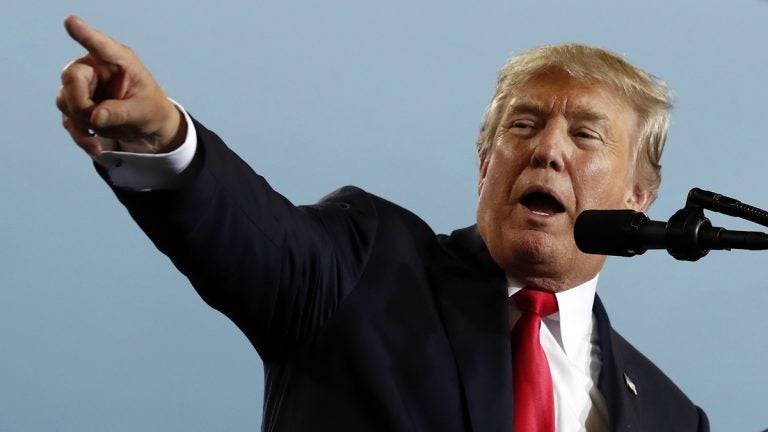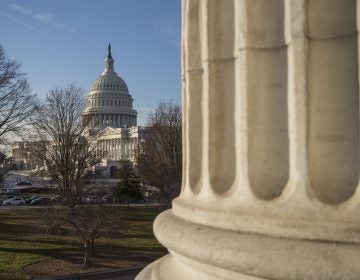The Trump-GOP tax reform proposal doesn’t match the rhetoric
Trump-GOP plan makes an unfair system even worse, rewarding the corporate elite and rich while leaving small businesses and the overall economy as losers.

President Donald Trump speaks about tax reform during an event at the Harrisburg International Airport, Wednesday, Oct. 11, 2017, in Middletown, Pa. (Alex Brandon/AP Photo)
President Trump defends his proposal to cut business taxes by claiming that it will lead to an increase in economic growth, new jobs, and higher wages.
But the Trump-GOP tax proposal doesn’t match his rhetoric, especially when it comes to people who own small businesses — and it’s those businesses that are responsible for most new jobs. Instead, the Trump-GOP plan makes an unfair system even worse, rewarding the corporate elite and rich while leaving small businesses and the overall economy as losers.
The first part of Trump’s business tax proposal calls for cutting the corporate tax rate from 35 percent to 20 percent and allows large corporations to immediately write off major purchases of equipment. Together these proposals will reduce taxes by $2.2 trillion over 10 years. If American corporations actually paid these high rates the president might have a case. But because of huge loopholes, available mainly to multinational companies, the actual rate corporations pay is just 14 percent, roughly the same as in other developed countries. Many pay nothing at all.
Higher levels of business investment would lead to faster growth and new job creation. And under some circumstances, a reduction in corporate taxes might help both, directly by increasing the return on investment, and indirectly by encouraging people who own stocks and bonds to save more, thus lowering the cost of capital. But those are not the circumstances in which the American economy has operated for a long time.
Corporate profits are historically very high, as is corporate saving. And the cost of capital, that is interest rates, are historically low. Investment will grow when consumption starts increasing. And that isn’t happening because the wages of working people and the middle class have long been stagnant and are growing too slowly now. Corporate taxes will do little to create more demand for the goods and services we produce because people in the income stratosphere already save much of their disposable income.
The best way to increase economic growth is to raise consumption among families at the bottom or middle of the income scale by increasing tax allowances for children, raising the minimum wage or increasing federal support for health insurance and college education.
Though Republicans constantly talk about small businesses, corporate tax cuts don’t particularly help them. Small corporations actually pay at a lower rate than large corporations already. And most small business are organized as pass-through entities for which business profits are taxed at individual, not corporate, rates.
A second part of the Trump-GOP plan is touted as directly benefiting those small businesses because it sets the rate on pass-through profits at 25 percent even if the individual tax rate of a business owner is higher. This proposal costs $770 billion over 10 years but only benefits business owners who have a net business income of $250,000 or more a year — and they make up just 6.6 percent of all business owners. The top 1 percent will receive 77 percent of the tax reductions, an average of $76,000 each year. This supposed cut to small business owners actually benefits wealthy people in sectors of the economy that are typically organized as partnerships or other such entities — hedge fund managers, wealthy lawyers, and doctors, and — it should come as no surprise — real estate developers, including Donald Trump. Those of us who own small businesses below the stratosphere would not benefit at all while this tax provision creates a new loophole for those with the highest incomes.
The third part of the Trump-GOP plan rewards corporations that have dodged $760 billion in corporate tax cuts by holding profits abroad a $600 billion tax cut to bring them home. Trump’s plan may eventually allow American based Corporations to escape from all taxation on foreign profits which will encourage them to send more jobs abroad.
The current tax system isn’t unfair because rates are too high or small businesses are hurt by it but because tax loopholes for large corporations are so large. That is why the corporate share of federal taxes has dropped from $1 of $3 in 1950 to $1 of $9 in 2015. Lowering rates a bit while limiting the ways that corporations dodge taxes might make sense. But cutting rates while expanding tax loopholes for corporations means that the rest of us — small business people and individuals alike — pay more than our fair share. And it also means that government doesn’t have the funds for the public investments in education, infrastructure, and health care that would create more demand, spur economic growth, and benefit everyone.
This is really what this debate over taxes is all about — whether to adopt the Trump-GOP plan, which is even more rigged to benefit the 1 percent, or to create a system that benefits small business owners, working people, and the middle class.
—
Marc Stier is the director of the Pennsylvania Budget and Policy Center.
WHYY is your source for fact-based, in-depth journalism and information. As a nonprofit organization, we rely on financial support from readers like you. Please give today.



